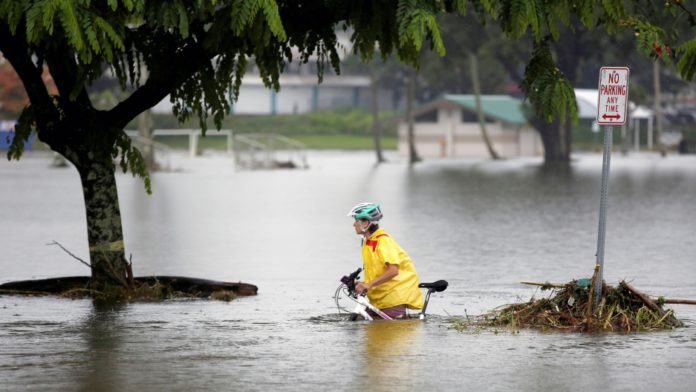
The here and now

Rubbing shoulders with the big boys, the housing crisis, Brexit and the shambles that is our mental health service, this plucky underdog vied for the attention of the people who control the purse strings. It jumped up and down, waved its hands in the air and, finally, frustratedly, took to shouting in the face of Minister for Finance, Paschal Donohoe.
But to no avail.
Its cries went unheard, its gesticulations unnoticed. While its high-profile contemporaries pocketed nine, and even ten, figure sums, this perennially ignored pipsqueak was left wondering what it had to do to get the attention it deserved.
Had the multitude of life-altering storms not strengthened its case?
What about the report, from no less an authority than the United Nations, that failure to act upon this crisis, this global crisis, could result in the death of millions? Was the end of civilisation as we know it not warning enough?
Seemingly not.
Sure, climate change was addressed in last week’s budget, it wasn’t totally overlooked: more than €100 million was assigned to restoring our forests, €70 million given to the Environment and Waste Management Project and measures taken to encourage drivers to use hybrid or gas-propelled vehicles. But critics say this isn’t enough, that we’re burying our heads in the sand, living in the here and now with little or no thought for what’s coming down the road.
God, that wouldn’t be like us at all.
In the grand scheme of things, Ireland’s contribution to climate change is but a drop in the ocean. Indeed between them, all the countries in the EU produce just 10 per cent of the world’s harmful emissions. Therefore, introducing a significant carbon tax here, as has been called for, wouldn’t make much of a difference to the world’s climate. Temperatures will continue to rise, hurricanes continue to blow, regardless of what happens here in little old Ireland.

We began charging a levy for plastic bags long before it was popular, introducing the scheme way back in 2002. Virtually every country in Europe followed suit – the UK finally cottoning on in 2015. How about the smoking ban? We were the first in the world to implement that, in 2004. Today, fourteen years later, you’d struggle to find a bar anywhere on the globe where lighting up is considered acceptable.
So we can’t hide behind that excuse.
No, the real reason why climate change wasn’t a priority in this budget, and why it won’t be in next year’s or the year after that, is because of us, the electorate.
If we’re not bothered about what happens in a hundred years’ time, about our grandkids and their grandkids, about rising sea levels, droughts, famine and the melting of the ice caps then why the hell should our government be? They can only ever respond to the needs of the people, produce measures designed to address whatever crisis we complain most keenly about. And right now, the future of Planet Earth is way down the list of most ordinary people’s priorities.
It’s not like we don’t care, we just don’t care enough.
When we see an advert warning us that the mountain gorilla is facing extinction and we must act now to save this beautiful creature, we reflect on how terrible it all is, how lovely those gorillas are, and then go back to worrying about paying our rent. When we’re told that eliminating meat from our diet would immediately reduce our carbon footprint by 50 per cent we smile nervously, say that climate change probably isn’t real, and go back to dreaming about juicy quarter pounders and succulent fillet steaks.
And were a carbon tax to be introduced, the price of coal and other fossil fuels to rise, do you think we’d applaud Minister Donohoe for his revolutionary stance, take pride in our nation’s efforts to save the planet? Of course we wouldn’t. We’d complain bitterly about the cost of heating the house and find some black-market trader willing to do us a few bags of doubles on the cheap.

You only have to look at the fortunes of the political party most closely aligned to environmental issues for proof of our disdain towards climate change. The Green Party currently have two seats in the Dáil, an improvement on the complete wipe-out they suffered in 2011.
Yet, in spite of all this, we need only look across the horizon for proof that, when push comes to shove, we can enact change. The Irish Cement factory in Mungret was found to have breached its industrial emissions license earlier this year, and received a fine, albeit a paltry one, to accompany its guilty charge. The charges related to an incident in December 2017 where a ‘dust leak’ from the factory affected local residents’ cars and property.
Further to this, is the controversy surrounding the granting of a license to burn alternative fuels at the plant. To date more than 3,500 objections to this proposal have been submitted to the Environmental Protection Agency (EPA). This groundswell of unrest has led to a delay in the granting of the license, a spokesperson for the EPA describing it as a “very complex case” which is unlikely to be resolved by the year’s end.
Would this case have been so complex but for the intervention of concerned residents? Obviously not.
But here’s the rub. Should this license be granted, over 80 jobs will be protected, with the possibility or more being created further down the line.
Now ask yourself this; would you be bothered about a few gallons of harmful emissions being released into the ether every day if it meant securing a well-paid, secure job with all the benefits, bursaries and brass tacks one might expect to receive from an established national organisation like Irish Cement? Would you sacrifice the possible wellbeing and health of your successors in exchange for ensuring you could keep a roof over your children’s heads, food on their plates? I’d imagine you would.
Essentially, we’re all about the here and now. If fireballs start shooting down from the sky, singeing our HD brows, ruining our New Balance runners, we’ll worry about it then, when it happens. And if a giant tidal wave washes over the whole country, wiping out our cities, causing us to flee to higher ground, we’ll all congregate in the Galty Mountains, have a few sambos, a bit of singsong and reminisce about the good old days; the days when we convinced ourselves that climate change wasn’t even a thing.
If you look nice but no-one’s there to take a picture did you really look nice?

See that picture at the top right-hand corner of the page? The one above my name? It doesn’t do me justice, captures me in a terrible light. It’s high time I got a new one done, one which might convey how dashing, how suave, how ravishing I really am.
But that would mean posing for the camera, subjecting someone to my neuroses, demanding one more shot, until eventually, after several hours, deciding to stick with the one I already have.
Because I always think I could look better. We all do. We have become a self-absorbed species, a vacuous, vainglorious breed who will go to any lengths to achieve perfection.
Take Sandra Manuela Da Costa Macedo, the 27-year-old Portuguese woman who died in Panama last week. The mother-of-two was sitting on the railings of her 27th floor apartment when she lost her balance and tragically plummeted to her death.
But why was she out there on the railings? Because she wanted to take a selfie, one with the Panama City skyline in the background, one which conveyed to her social media followers just how exciting her life was.
And she’s not the only one to perish in such fashion. Over 250 people have died taking selfies since the advent of the smartphone, the causes of death ranging from drowning and being hit by trains to gunshot wounds and electrocution.
So the next time you find yourself in impossibly beautiful settings, surrounded by breath-taking scenery, waterfalls, ravines, all that good stuff, just take in the moment, resist the temptation to share it with your beloved followers, and make sure you get home safe and sound, with your face, and the rest of you, perfectly intact.


